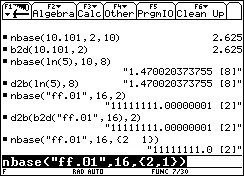b2d(): 1.0 (September 22, 1999)
d2b(): 2.0 (March 07, 2000)
b2d(): Converts floating point numbers of any base to decimal.
d2b(): Converts floating point decimal numbers to any base.
March 07, 2000 - Modified nBase() and d2b() to return list of character values when base>36.


nBase(NumberStr | {NumberStr}, CurrentBase, NewBase | {NewBase, Precision})
b2d(NumberStr, CurrentBase)
d2b(NumberStr | {NumberStr}, NewBase | {NewBase, Precision})
NumberStr: Alphanumeric STR representing a number to any base. if NumberStr is entered in braces, {}, a list of character values will be returned.
CurrentBase: The number base of NumberStr.
NewBase: The number base that NumberStr should be converted to.
Precision: Optional precision. Changes the limit of the number of fractional positions from the default of 12. The default can be permanently changed by editing the line "12->pre" in the program code to the desired value.
NOTE: These functions will accept bases greater than 36 but only 35 characters are available. This is permitted so that numbers of greater bases can be converted. If a character of value 3510 or greater is needed, a list of character values is returned instead.
NOTE: These functions will accept numbers (var type NUM) in NumberStr so that the user can more easily enter numbers of base 10 or less. Ex: nBase(10,2,1020)="2 [1020]" instead of nBase("10",2,1020)="2 [1020]"
Return value:
If any character in NumberStr is illegal in CurrentBase,
undef is returned.
nBase(): If NumberStr is a STR, a STR is returned. if
NumberStr
is a NUM and NewBase=10, a NUM is returned. If
NumberStr
is enclosed in braces, {}, a list of character values is returned.
d2b(): A STR is returned.
b2d(): Normally a NUM is returned. If NumberStr is enclosed
in braces, {}, a list of character values is returned.
Examples:
1. nBase(10.101,2,10) or b2d(10.101,2)
2.625
2. nBase(ln(5),10,8) or d2b(ln(5),8)
"1.470020373755 [8]"
3. nBase("FF.01",16,2) or d2b(b2d("FF.01",16),2)
"11111111.00000001 [2]"
4. nBase("FF.01",16,{2,1}) or d2b(b2d("FF.01",16),{2,1})
"11111111.0 [2]" 1.
5. nBase({10.101},2,{11,2}) or d2b({c},{11,2})|c=b2d(10.101,2)
{2, ".", 6, 9}